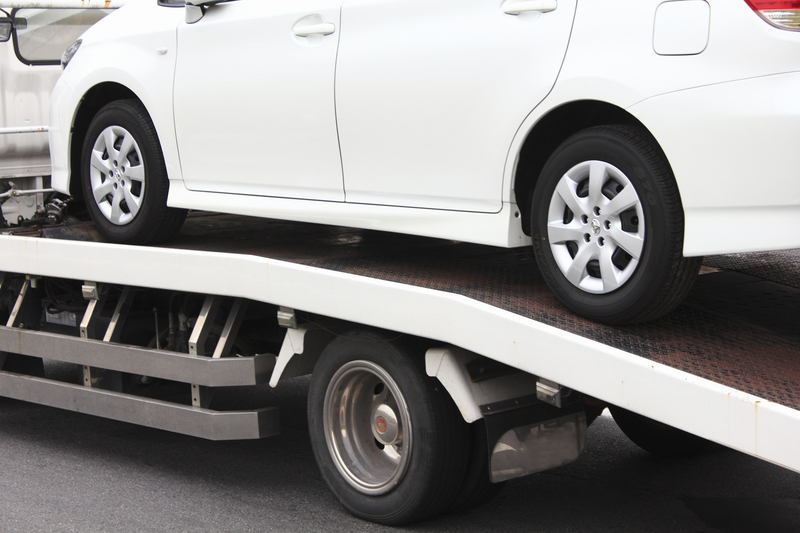Plan and Execute a Stress-Free Relocation
Posted on 25/05/2025
Plan and Execute a Stress-Free Relocation: The Ultimate Guide
Relocating to a new home, city, or even country can be both exciting and overwhelming. The thought of a fresh start, new opportunities, and unexplored surroundings brings joy, while the daunting task of moving all your belongings can invite stress and anxiety. However, by applying strategic methods to plan and execute a stress-free relocation, the process can be transformed from a hectic ordeal into a smooth, well-orchestrated experience.
This comprehensive guide will walk you through every stage of moving, offering proven strategies designed to minimize stress, streamline the process, and provide peace of mind. Whether you are a seasoned mover or facing your very first major transition, read on for practical, actionable advice you can put to use right away.

Benefits of a Well-Planned Relocation
- Reduces anxiety: Thorough planning helps break tasks down into manageable steps, minimizing feelings of overwhelm.
- Saves time and money: Organization eliminates last-minute rushing, helping you avoid wasted time and unnecessary expenses.
- Protects belongings: Careful handling and packing means less risk of damages or loss during your move.
- Smoother transition: A strategic approach ensures both you and your family adjust more quickly to your new environment.
Now, let's explore every aspect of how to plan and execute a stress-free move, from the earliest stages to setting up your new home.
Step 1: Early Preparation Is Key
Create a Moving Timeline
As soon as you know you are relocating, start crafting a moving checklist and a relocation calendar. The more time you give yourself, the easier it will be to tackle one task at a time and avoid last-minute chaos.
- 8 weeks out: Begin researching moving companies, clear out unwanted belongings, and notify your landlord or current property manager if required.
- 6 weeks out: Organize important documents, update addresses, and collect packing supplies.
- 4 weeks out: Start packing non-essential items, schedule moving services, and finalize travel arrangements.
- 2 weeks out: Pack essentials, arrange utility transfers, and confirm logistics with movers.
- 1 week out: Perform a final clean-up, confirm moving day details, and prepare essentials bags for moving day.
Downsize Before Packing
Before you even think about packing, decluttering is essential. Moving gives you the perfect opportunity to assess your belongings and decide what truly matters.
- Sort items: Decide what to keep, donate, sell, or dispose of. This reduces moving volume and costs.
- Organize a yard sale: Earn extra cash and lighten your load at the same time.
- Donate to charity: Make a difference while minimizing what you need to transport.
Tip: Be ruthless--if you haven't used it in a year, you probably won't need it in your new home!
Step 2: Budgeting for a Smooth Move
Anticipating expenses can help keep your move within financial limits and avoid surprise costs. When planning a stress-free move, consider all probable expenditures:
- Professional movers: Quotes vary by distance, service type, and timing.
- Packing materials: Boxes, bubble wrap, tape, and specialty containers
- Travel expenses: Gas, vehicle rentals, lodgings, meals on the road
- Utility deposits: Set-up fees for electricity, water, internet, and gas
- Pet or childcare: Temporary services to assist during packing or moving day
- Storage costs: Short-term rentals if you need extra space
Record all moving-related expenses in a spreadsheet and keep all receipts for reimbursements or for tax season, if applicable.
Step 3: Choosing the Right Moving Company
Research Movers Carefully
Choosing a reliable moving company is one of the most critical steps for a stress-free relocation:
- Read online reviews and compare ratings on trusted platforms such as Google, Yelp, or the Better Business Bureau.
- Request quotes from at least three companies to compare prices and services.
- Ask about insurance liability, handling of fragile items, and hidden surcharges.
- Check for proper licensing and credentials, especially for interstate relocations.
Ask the Right Questions
When interviewing relocation services, ask:
- Are you fully licensed and insured?
- What is your cancellation policy?
- Can you provide written estimates and contracts?
- How do you handle specialty or valuable items?
- Do you subcontract any part of the move?
Remember--quality and trustworthiness matter more than the lowest price when you want a seamless and stress-free moving experience.
Step 4: Smart Packing for a Stress-Free Move
Create a Packing Strategy
Packing mistakes often lead to stress. Organize a plan for what to pack and in what order.
- Gather supplies: Cardboard boxes, bubble wrap, packing paper, labeling markers, and heavy-duty tape.
- Room-by-room method: Pack up each room separately, labeling each box with content and destination room.
- Essential boxes: Pack first-night essentials (toiletries, medications, clean clothes, chargers) in clear bins you can find easily.
- Fragile items: Wrap delicate belongings securely and label boxes as "Fragile".
Label and Inventory Everything
Number and label each box. Consider using color-coded labels for each room to expedite both unloading and unpacking.
- Keep an inventory for insurance and tracking purposes.
- Photograph valuables and electronics setups for easy reassembly.
Enlist Help
Don't hesitate to involve family, friends, or professional packers. The more hands, the lighter the work--and stress.
Step 5: Notify, Transfer, and Update
Complete Necessary Address Changes
Notify all relevant individuals and organizations of your new address to prevent service interruptions:
- Postal service: Submit a change-of-address form online or at your local post office.
- Utilities: Arrange for service transfer or disconnection.
- Banks and credit cards: Update billing addresses to keep financial records current.
- Medical providers: Request records transfer and inform of your move.
- Schools, employers, subscriptions: Update contact and delivery details.
Secure and Organize Documents
During the upheaval of moving, documents are easily lost. Keep all vital records, leases, and contracts in a secure and easily accessible folder or digital drive.
Step 6: Packing a Last-Minute Essentials Kit
On moving day, having key items at your fingertips will make the transition smoother. Include:
- Toiletries and personal hygiene items
- Medications and first aid supplies
- Chargers and electronic devices
- Snacks and water bottles
- Bed linens and towels
- Children's comfort items or pet supplies
This kit prevents frantic unpacking in search of necessities when you first arrive at your new home.
Step 7: Make Moving Day a Breeze
Review Your Moving Plan
- Wake up early to allow extra time for unplanned events.
- Review your inventory with movers and confirm destination instructions.
- Do a final walkthrough of your old place to ensure nothing is left behind.
Communicate Clearly
Stay in touch with your moving team. Be available to answer questions and direct activities as needed to keep things flowing smoothly.
Take Care of Yourself
Remember to eat, hydrate, and take short breaks. Moving is physically and emotionally taxing, but maintaining self-care reduces stress and prevents exhaustion.
Step 8: Settling Into Your New Home
Unpack with Purpose
- Start with essentials--set up beds, bathrooms, and kitchen basics first.
- Unpack one room at a time according to your color-coded labels or plan.
- Check for damages or missing items as you go, and contact movers immediately if needed.
- Break down boxes after unpacking to keep your space tidy.
Explore Your New Community
Once the immediate tasks are complete, take time to become familiar with your surroundings. Discover local amenities, meet your neighbors, and investigate local restaurants, stores, and parks. This assists greatly in turning your new house into a real home.
Update Local Registrations
- Register your car and update your driver's license if you've moved to a new state or country.
- Find local doctors, veterinarians, or essential services as needed.
- Select new grocery, banking, and school options if necessary.
Pro Tips for a Hassle-Free Move
- Stay flexible: Moving plans can change unexpectedly. Keep a positive, adaptable mindset.
- Use moving apps: Technology can help you organize checklists, inventories, and manage timelines.
- Label all cords and electronics: Prevents setup confusion in your new home.
- Schedule disconnect/reconnects early: Utilities may need several days' notice.
- Photograph valuable goods: Helpful for insurance claims if loss or damage occurs.
- Double-check every detail: From travel reservations to pet care, thoroughness spares stress later.
Common Mistakes and How to Avoid Them
- Underestimating time and cost: Start early and err on the side of caution regarding your schedule and budget.
- Ignoring insurance: Always ensure your belongings are protected by adequate coverage.
- Poor labeling: Vague or missing labels make unpacking a slow, frustrating process--be specific!
- Procrastination: Last-minute packing leads to mistakes, damage, and elevated stress levels.

Conclusion: Your Roadmap to a Stress-Free Relocation
Planning and executing a stress-free relocation is about being proactive, organized, and calm. By following these steps--preparing early, budgeting carefully, choosing trustworthy movers, packing smart, updating important records, and taking care of both logistics and emotional well-being--you're sure to make your move streamlined and positive.
Remember: Every relocation, regardless of distance, signals a new beginning. Embrace the process, stay organized, and celebrate your successful transition to a new chapter of life. With thoughtful preparation and an intentional approach, moving doesn't have to be stressful--it can be an exciting journey filled with opportunity and optimism!
Frequently Asked Questions about Relocation Planning
Q: How far ahead should I start planning my move?
A: Ideally, begin planning your move at least 8 weeks in advance. This provides ample time to research movers, downsize, and complete administrative tasks without pressure.
Q: What's the most important thing to remember for a stress-free move?
A: Staying organized with detailed checklists, labels, and proactive communication is key for a seamless relocation.
Q: How do I reduce costs during a move?
A: Declutter before packing, compare multiple moving quotes, and handle some tasks (like packing or truck rental) yourself to save money.
Q: Should I hire professional packers, or can I do it myself?
A: If you value time savings and protection for fragile or valuable items, professionals are worth it. However, DIY packing can be cost-effective if you plan carefully and start early.
Ready to plan and execute a stress-free relocation? With these expert tips, your move will be smoother, more efficient, and even enjoyable!
Latest Posts
Unlock expert strategies for effective house cleaning pre-move
Master Tips for Smooth Bed and Mattress Moves
Freezer Care: Storing Properly For Extended Periods



